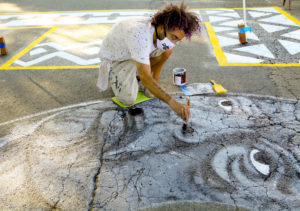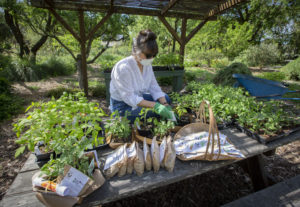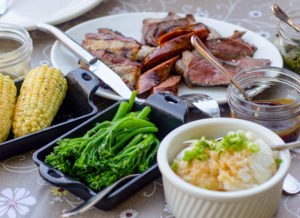Make the most of sunny and clear days with some al fresco dining. We’ve put together a list of our favorite outdoor dining spots in Sonoma Valley that will give you the best of both worlds with beautiful patios and great food. Click through the above gallery for photos. Did we miss one of your favorites? Let us know in the comments.
Grace Yarrow contributed to this article.
Black Bear Diner: Open daily for outdoor dining with everything from sweet cream pancakes to a Bigfoot chicken fried steak. Find the menu and place your order online. 201 W. Napa St. #34, Sonoma, blackbeardiner.com.
Cafe La Haye: Sidewalk seating with changing weekly menus. Email info@cafelahaye.com or call 935-5994. 140 E Napa St, Sonoma, 707-935-5994, cafelahaye.com.
Cochon Volant: Slow-cooked BBQ meats, sandwiches and more. See menu here. 18350 Sonoma Hwy, Sonoma, 707-509-5480, cochonvolantbbq.com.
Della Santina’s: Patio dining open for authentic Northern Italian cuisine, with pastas, breads, soups and fish referred to as “Tuscan Soul Food.” 133 E Napa St, Sonoma, 707-935-0576, dellasantinas.com.
Depot Hotel Restaurant: Hotel garden is open for outdoor dining. Serving pizzas, pastas, soups and salads. 241 1st St W, Sonoma, 707-938-2980, depotsonoma.com.
El Dorado Kitchen: Located in El Dorado hotel, serving California cuisine for take-out which can be enjoyed inside or elsewhere. 405 First St West, Sonoma, 707-996-3030, eldoradosonoma.com/kitchen.
HopMonk Tavern: Beer gardens open with special live music events, complete with shareable wings, fries and a rotation of draft beers. 691 Broadway, Sonoma, 707-935-9100, hopmonk.com/order-sonoma.
Jack London Lodge: Newly revamped, this historic space has a lively outdoor saloon and casual bar menu. 13740 Arnold Dr., Glen Ellen, 707-938-8510, jacklondonlodge.com.
La Casa Restaurant: Garden patio dining in its El Paseo courtyard. Serving traditional Mexican food — and, of course, fresh margaritas. 121 E Spain St, Sonoma, 707-996-3406, lacasarestaurants.com.
LaSalette Restaurant: Now open for patio dining with a number of Portuguese specialties for lunch and dinner. 452 First St East, Sonoma, 707-938-1927, lasaletterestaurant.com.
Layla at MacArthur Place: Al fresco dining with farm-fresh ingredients and seasonal menus. Reservations recommended. 29 E. MacArthur St., Sonoma, 707-938-2929, macarturhplace.com.
Les Pascals Patisserie et Boulangerie: Open for dine-in with fresh breads, pastries and mini sandwiches. 3798 Arnold Dr., Glen Ellen, lespascalspatisserie.com.
Mary’s Pizza Shack: Patio dining with pizza, pasta and other family dishes. 8 West Spain St., Sonoma, 707-938-8300, maryspizzashack.com.
Murphy’s Irish Pub: Indoor and patio seating. Signature dishes include leg of lamb, summer salad and beer-battered fish and chips. Come on Wednesdays for trivia night. 464 1st St E, Sonoma, 707-935-0660, sonomapub.com.
Palooza: Patio dining with burgers, wood-fired pizza and more. 8910 Sonoma Hwy, Kenwood, 707-833-4000, paloozafresh.com/kenwood-menus.
Picazo Cafe & Deli: Patio open for sandwiches, salads, and brunch. (Don’t forget your bottomless mimosa!) 9100 Arnold Dr, Sonoma, 707-931-4377, picazocafe.com.
Reel and Brand: Approachable dining with one of Sonoma’s best outdoor patios. Frequent live music shows and happy hour. 401 Grove St., Sonoma, 707-938-7204, reelandbrand.net.
Salt & Stone: Now open for patio dining for brunch, lunch, dinner and, of course, happy hour. 9900 Sonoma Hwy, Kenwood, 707-833-6326, saltstonekenwood.com.
TIPS Roadside: Dinner and brunch reservations available for outdoor dining. 8445 Sonoma Hwy, Kenwood, tipsroadside.com.
Yeti Restaurant: Enjoy Nepalese cuisine at this unique and authentic restaurant. 14301 Arnold Dr, Glen Ellen, 707-996-9930, yeticuisine.com.













